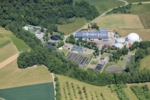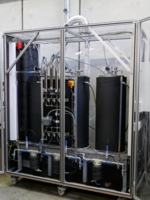Bioenergy
Examples of fuels produced from biomass are biomethane, renewable natural gas (RNG), biogenic hydrogen, biokerosene, biomethanol, bioethanol and higher alcohols. However, in future, care must be taken to avoid the well-documented conflict between crops used for food and those used for fuel production. The bioeconomy strategy therefore calls for only using the biomass that cannot be used for producing food. Microalgae, biowaste and residual materials have huge potential in this area.
-
Project BW2Pro - 29/08/2022

In 2020, Germany’s population collected over 5 million tonnes of biowaste. Most of this was composted, and some was fermented into biogas. Scientists in Baden-Württemberg think there's room for more. Within the project ‘Biowaste to Products’ (BW2Pro) they want to transform biowaste into new products in a biorefinery. The idea is to produce biodegradable plant pots, mulch material, fertilisers, enzymes and biobased plastics in addition to…
-
From field to socket - 03/02/2021

Biogas plants that produce non-fossil fuels are very much in vogue at the moment. In the Swabian hamlet of Hahnennest, four family farms have joined forces to form an energy park and operate a local biogas plant, covering everything from substrate production to the sale of energy.
-
Perspectives of methane as energy source - 18/06/2020

The microorganisms in biogas plants do a great job biologically converting CO₂ and hydrogen, which are primary fermentation products, into methane. Biomethane has a great future as an energy source. Scientists at the University of Hohenheim are investigating new ways to produce and use biomethane.
-
Article - 08/05/2019

In cooperation with the research unit of the German Technical and Scientific Association for Gas and Water (DVGW), KIT researchers have built a pilot plant in which biogas produced by fermenting residual organic materials can be upgraded to synthetic methane (synthetic SNG). Biobased methane is not only a sustainable energy source for the heating and transport sectors, but also opens up new opportunities for temporary storage of renewable…
Website address: https://www.biooekonomie-bw.de/en/articles/bioenergy



